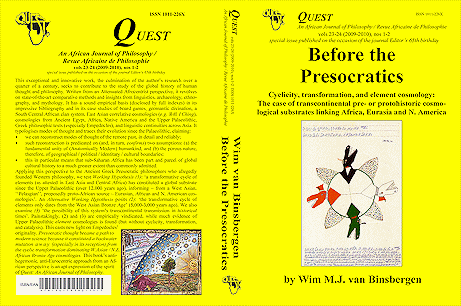 ISSN 1011-226 |
Quest |
An African Journal of Philosophy |
|
Revue Africaine de Philosophie |
Quest can
only survive and thrive if you send us your best articles as contributions/
Quest
ne saura survivre et croitre que sur condition que vous nous envoyez vos
meilleurs articles comme contributions
if the lettering on this page
is too small for your eyes, adjust it under 'View' in the Menu of your browser
si les charactères sur cette page sont trop petits pour votre yeux, ajustez-les
sous View/Vue dans le Menu de votre browser
THE RESUSCITATION OF QUEST
Since early 2009, when the last three annual volumes (XX, XXI, XXII: 2006, 2007, 2008) of Quest: An African Journal of Philosophy / Revue Africaine de Philosophie were published, our journal (like so many others) has gone through a bumpy patch. The same year saw the end of the five-year hospitality agreement between this journal and the African Studies Centre, Leiden, the Netherlands. The Editor had negotiated this agreement in 2004 (as the only successful outcome of a long series of international applications for subsidy), and though it had failed to bring the secretarial and administrative assistance so badly needed, it had at least paid for printing and postage. We thank the African Studies Centre for its loyal support over these five years, and for its more incidental support in the future. Against the background of the international financial crisis from 2008 onward, revenue from subscriptions, sale of back issues, and reprint fees dwindled, and costs of printing, web design, hosting and postage were mounting. Meanwhile Quest was enjoying ever greater popularity on the part of established and junior contributors, and also the quality of the articles submitted went from strength to strength. Under those circumstances the Editorial Board saw no alternative but to sit back and wait until the financial situation would clear up sufficiently to produce, dispatch and host new annual volumes. In 2011-2012 the felicitous reprint of three Quest articles in the Eboussi Boulaga Festschrift edited by Lidia Procesi and Kasereka Kavwahirehi (Beyond the lines: Fabien Eboussi Boulaga, A philosophical practice / Au-delà des lignes: Fabien Eboussi Boulaga, une pratique philosophique, Munich: LINCOM), and the fees secured in that connection through the good services of Professor Valentin Mudimbe (Member of the Quest Advisory Editorial Board) seemed to bode better times for our journal; but then the Editor went down with serious illness for two periods of half a year each. By the end of 2012, these medical hurdles had finally been taken, and three new annual volumes are now lined up for imminent publication, before the middle of 2013 – including one special issue on Masolo under the guest editorship of Professor Thaddeus Metz from South Africa. A cheaper production process yet more attractive format were meanwhile initiated, of which the present double annual volume XXIII / XXIV (2009-2010) is the first implementation. For, rather than already bringing out these three volumes, we decided that we should first devote the combined annual volumes XXIII-XXIV to a long-standing book project of the Editor, in honour of his 65th birthday, and in recognition of his contributions to Quest and to the sake of African philosophy over the past decade. The book’s anti-hegemonic, anti-Eurocentric approach to long-range transcontinental philosophy from an African perspective is a fitting expression of the spirit of Quest, and a significant contribution to the global history of philosophy. While the digital version of Vols XXIII-XXIV was already made available at the Quest website by the end of 2012, the printed version is only dispatched now, due to practical difficulties. These Vols XXIII-XXIV will be sent to all those who held a subscription for the years 2009-2010. The annual volumes XXV and XXVI (to be published before Autumn 2013) will be sent to entitled subscribers i.e. those holding a paid-up subscription up to and including 2012. Those who understandably suspended their payment in the belief that Quest had ceased to be published, are advised to renew and pay up. Invoices to that effect will go out in September 2013. Subscriptions may also be renewed using the relevant page on the Quest website, http://www.quest-journal.net/subscriptions.htm , or simply by an e-mail to shikandapress@gmail.com . After keeping the subscriptions at a constant, low level for over a decade, we are now forced to slightly raise the subscription fees as from January 2013:
|
to a postal address inside Africa: € 32.50 (institutions), € 32.50 (individuals) (was € 30). | |
|
to a postal address outside Africa: € 45 (institutions), € 45 (individuals) (was € 40). |
Volume XXVII (on Masolo) is to appear in October 2013 and will be sent to all those then qualifying. Of course, all this only applies to the printed version of Quest – as ever since 2002, Quest will continue to be made freely available through open access on the Internet, which makes for wide and unimpeded access world-wide and especially in Africa. All correspondence including submission of contributions, and subscription matters, henceforth to be sent to shikandapress@gmail.com . We trust that with these positive developments, the resuscitation of Quest is a fact, and we count on your continued support, Wim van Binsbergen, Editor
